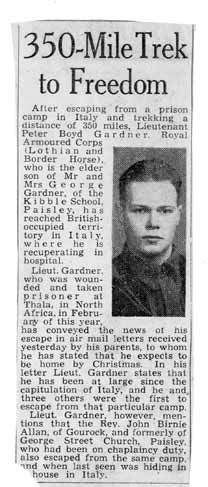themes
themes
Page 2
1 | 2 | 3 | 4
The World Wars

Remembrance Day
Kibble’s archive contains numerous references to boys leaving Kibble and enlisting in the armed forces. Many went on to see active service in both world wars. We have now compiled a roll of the boys who enlisted from Kibble during WWI.
The Home Front
In response to requests from the Home Office that ‘the boys of the Reformatory and Industrial Schools of Scotland should come forward at the present juncture and help the country in active service and in the munitions factories’, staff and boys from Kibble also worked in Beardmore’s munitions factory. A 1915 report in Kibble’s Minutes of the Industrial Committee states that 101 boys and 4 staff were employed there at that time. This included night shift working. This employment of the boys was bitterly opposed by the Labour Party. It contributed to significant industrial unrest and strike action and was part of much wider industrial conflict along Clydeside in particular. The main objections to boys carrying out this work related to the dangerous nature of the work and its consequent unsuitability for children, the drudgery involved, and workforce concerns about the dilution of labour: the increased use of mechanisation, semi-skilled and unskilled labour. The Beardmore’s strike of March 1916 was broken when Viscount Weir, Munitions Controller in Scotland, had shop stewards arrested and ‘deported’ to Edinburgh.
October 1916 letters from Paisley Trades and Labour Council to Mr Love, headmaster of Kibble, shed more light on Labour Movement concerns. They refer to the issue of boys’ employment at munitions work and list the Trades Council’s objections in the strongest terms. They bluntly refute Mr Love’s defence that the boys were ‘doing their bit to help their country in her extremity’. They argue that although the boys may claim to enjoy the work this is due to their naiveté and feeling that they are ‘grown up and at work’, as well as the ‘inducement of extra pocket money’. Furthermore, they believe that the work ‘is barren, in that it is subjectively unproductive and that it is a blind alley (dead end) occupation’.
Wartime austerity is another issue reflected in Kibble’s records. The Home Office wrote to the school in April 1915, requesting details on farm and garden production on Kibble’s farm. Kibble’s Industrial Committee records show that during this period acreages given over to oats and potato production were steadily increased, while hay acreage was reduced. This would have been in response to wartime food shortages and Home Office requests to increase food crop output. A 1917 entry in these records says that ‘This is the first year we have ground our own oats for meal for the use of the school’.
Industrial Committee minutes also highlight the difficulties caused by the War, especially to the farm, saying, ‘It will take a year or two to bring the Farm Department back to the condition it was in’.
Second World War
As with WWI, Kibble’s archive records cases of enlistment and War Service. These include references to the war experience of Peter Gardner. Peter’s father, George, was headmaster of Kibble from 1928 – 1952 and Peter was a teacher in the school before being appointed Head in 1952.
Active Service
Peter Gardner was commissioned into the 2nd Lothians and Border Horse tank regiment and posted to North Africa. Wounded at the Battle of Kasserine Pass in Tunisia, he was taken prisoner to a camp near Parma, Italy. He escaped in October 1943 and, despite being injured by shrapnel, he trekked more than 300 miles across the Alps to Switzerland in winter, and eventually into Allied lines. His sister, Jean, told us that this was a very worrying time for the family, as they were informed that he was ‘missing from operations’ in North Africa in February 1943 and had to wait months for news of his whereabouts. By the end of his Army service, Peter had achieved the rank of Major. He was awarded an MBE in the King’s birthday honours of 1947, in his capacity as Headmaster of Kibble Approved School. He said at the time that he regarded the honour as a recognition of the services he represented rather than a personal award.
Kibble was kept informed of the whereabouts of boys fighting in the war by their families, by visits from former boys while they were on leave, and occasionally by letters and postcards from them. There are many such cases in our records but it is possible to mention only a few examples here. In April 1940 one former boy sent a letter to the Headmaster from ‘somewhere in France, appreciating his treatment in the school’. Another was reported in 1943 as being still at sea. He had ‘been round the world and been torpedoed once’. Yet another was ‘reported by his family as being a Prisoner of War in Germany. One boy sent a letter in 1941, when he was a POW in a German Stalag, asking for cigarettes. A former pupil visited Kibble in 1945 and told them he had been a POW in Poland; he was recorded in Kibble’s records as being ‘not now physically fit’.

